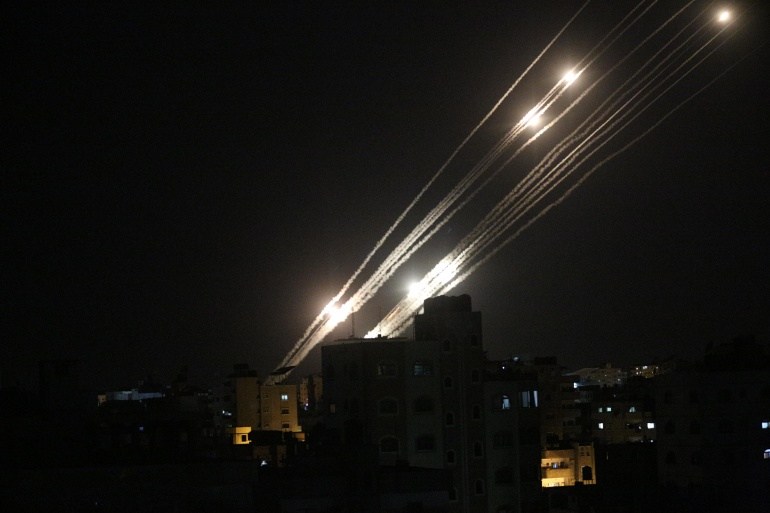Without any cease-fire in sight yet, Israelis and Palestinians are preparing themselves for more mutual airstrikes that until now have cost the lives of 11 Israelis and at least 192 Palestinians and more than one thousand wounded people. The death toll is rising day by day.
According to the Palestinian Health Ministry in Gaza, less than a third of the fatalities are women and children. Israel claims that some of the civilians were killed by falling rockets inside Gaza that were launched from Gaza by Hamas. Neither Hamas nor Israel have reported the number of killed Hamas militants.
About 3,000 rockets have been fired against Israel since the hostilities started. The majority of which have been intercepted by the air defence Iron Dome.
High Representative Josep Borrell, EU’s foreign policy chief, issued on Wednesday afternoon a call for an immediate end to the ongoing violence which affects the civilian populations on both sides but stopped short of announcing any concrete steps to bring about a cease-fire.
The US has called the Israeli government and is sending an envoy to meet the leaders on both sides. The United Nations Security Council is scheduled to convene on Sunday to discuss a cease-fire while Egypt and other countries are trying to mediate between Israel and Hamas.
Update on Monday: All members of the Security Council called for an immediate halt to fighting between Israel and Hamas but the Security Council could not agree on a joint resolution. In the meantime, intensive efforts are continuing to mediate between the two sides and prevent further escalation and losses in civilian lives.
In the statement, Borrell denounced the indiscriminate launching of rockets from Hamas and other groups towards Israeli civilians as unacceptable and recognised Israel’s legitimate right to protects its civilian population but also indirectly accused Israel of disproportionate use of force in a conflict that is asymmetrical.
In a new statement on Saturday evening (15 May), the High Representative elaborated on his outreach to both sides in the conflict and described EUs diplomatic efforts to contribute to defusing the ongoing violence. In particularly he stressed the need to address the root causes that have led to the current situation and escalation.
“In all his contacts, High Representative Borrell condemned Hamas’ and other groups’ indiscriminate firing of rockets against civilian targets in Israel,” the statement says. “The EU’s priority and message in this context remains clear: violence must end now.”
Contrary to previous statements, for example, during the 51-day long Gaza-Israel war in 2014, the EU did not this time condemn Hamas for using civilians as human shields and did not demand that the terrorist organisation should be disarmed.
Hamas is ruling the Gaza Strip since 2006 and is considered a terrorist organisation by the EU and the international community.
The sudden escalation of hostilities between the Hamas-ruled Gaza Strip and Israel started after the cancellation by the Palestinian Authority in the West Bank of long-overdue elections which would have favoured Hamas. Israel did not allow the elections to take place in East Jerusalem and did not reply to requests from the EU to send election observers.
Tension was already high following the outbreak of violent demonstrations in Jerusalem during the holy Muslim month of Ramadan when Israeli police acted heavy-handed in riots in Jerusalem and put fences at the Damascus Gate square leading into the old city of Jerusalem.
The fences were eventually removed but in another provocative act, the Israeli government allowed a flag parade by far-right Israelis to take place on Jerusalem Day on Monday and enter the Old City through another gate. For the Palestinians, this was seen as a threat against the mosques on the Temple Mount. Hamas framed its launch of rockets against Israel as a battle for Jerusalem.
Along with the escalation in hostilities between Israel and Hamas, unprecedented riots have broken out in mixed Jewish-Arab cities in Israel. The riots were carried out by far-right Jewish extremists and Arab criminal gangs and radicalised youth and included stone-throwing on neighbours, live fire, arson and even lynching. Almost 1,000 Arab and Jewish rioters have been arrested.
Israel’s President Reuven Rivlin has issued an urgent call to the Israeli-Arab leadership to speak up and condemn violence in the mixed communities. “The silence of the [Israeli] Arab leadership about these disturbances is shameful, giving support to terrorism and rioting and encouraging the rupture of the society in which we live and in which we will continue to live once all this has passed.”
The Israeli opposition leader Yair Lapid, who received the mandate of the president to form a “government of change”, said in a televised speech on Thursday evening that the riots inside Israel are an existential threat to the country and to Jewish-Arab co-existence.
”A country isn’t only land, an army and a flag. A country is based on the rule of the law which we all have to obey,” he said. “Without the rule of law, there is no personal security. The day citizens take the law in their hands, there is no state.” More than ever a new government supported by the majority of Israelis, Jews and Arabs, is needed, he said.
One Sunday, Lapid twitted that, “If we had another government, security considerations wouldn’t have been mixed with political concerns. No-one would have asked himself why fire always breaks out when it’s convenient for the Prime-Minister.”
The article is continously updated.
The Brussels Times

